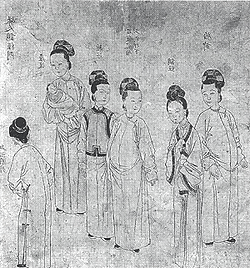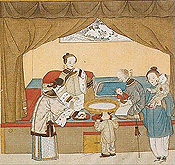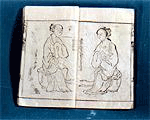Pathological Characteristics of Women in TCM Viewpoints
According to TCM theory, the causes of women’s diseases are nothing more than congenital deficiency, early marriage, multiple births, indulgence, physical exhaustion, improper diet, accidents as well as infections. The internal disturbances are mainly associated with organ dysfunctions and disharmony movements of qi (vital energy) and blood, however there also some characteristics in the disease development of women.

Disharmonies of blood and qi play the major roles in development of women diseases. Menstruation, pregnancy, childbirth and lactation are unique to women. Blood is the elementary basis of these female physiological functions, hence TCM has the saying that “women take blood as primary.” Due to the periodic loss of blood through menstruation, TCM believes that women tend to be in a state of blood insufficiency and is relatively excess qi inside the body. As the blood and qi mutually generate and depend on each other, they influence each other pathologically. Anyway, women are more likely to develop blood and qi disharmony than men. For other causative factors like six evils and seven emotions, pathogens like coldness, heat and dampness are more likely to damage the blood activities; emotional distress like angry, anxiety and fear are likely to damage qi activities.
Women’s diseases are often resulted from damages of the four extra meridians, namely Thoroughfare Vessel, Conception Vessel, Governor Vessel and Girdling Vessel. These extra meridians damages can be due to evil invasions or excess sexual activities directly, or in other cases, influenced by the disorders of qi, blood or organs indirectly.
Apart from above, unhealthy lifestyle is influential too, they often affect the internal body functioning and give rise to various gynecological and maternity diseases.
Constitutional factors
Because of inherent differences or acquired influences such as the environment, diet, nutrition, injuries and diseases, there are subtle variety in the body’s structural, physiological and psychological aspects of people. These individual characters combine to form body constitution that determines how we live and behave, and our susceptibility to pathogens and disease development. For example, those who have a spleen deficiency tend to develop menstrual and fertility problems; while a kidney deficiency body tend to develop problems like miscarriage, stirring fetus or infertility.
Excessive sex and multiple pregnancies

Excessive sex induces kidney damage, and the exhausted body can develop diseases easily. During menstruation, pregnancy and delivery, women should be especially cautious and abstain from sex so as to avoid the development of vaginal infections and miscarriage. In addition, women who have had multiple pregnancies or frequent deliveries (including miscarriage, abortion or induced abortion) may have caused serious damages in their blood and qi activities, and dysfunction in the Conception and Thoroughfare Vessels, which become the important inducing factors for various gynecological diseases.
Imbalance between rest and work
Appropriate work and rest balance is essential for smooth yet healthy menstruation, pregnancy, delivery and breastfeeding in women. On one hand, it is unhealthy to stay inert and sedentary life, as it leads to sluggish flow of blood and qi inside the body; on the other hand, extreme exercise or heavy physical work will make the body exhausted, leading to instability of the meridians surrounding the uterus. Commonly seen problems associated with these include heavy menses, miscarriage, abnormal fetal movements and threatened abortions or a prolapsed uterus in the postnatal period.
Improper diet
You are what you eat, the Chinese emphasize good eating habits. Too much frozen and raw foods, too much hot and deep fried, over-eating, eating at irregular times, and eating too fast are all considered unfavorable factors for health. For example, too much hot and spicy foods cause heat accumulating in the Conception and Thoroughfare Vessels, which force the blood to go astray. Problems like a short menstrual cycle, heavy menses and miscarriage can be induced. However, eating too much frozen and raw foods, especially during the periods of menstruation and pregnancy, can damage the spleen functioning and cause cold dwelling on the blood and meridians. The Conception and Thoroughfare Vessels become affected and problems of dysmenorrhea (painful menses), missed period, irregular menses, abnormal vaginal discharge and abnormal fetal movements may develop.
Accidents and injuries

If accidental falls that damaged the waist or heat region, it can affect the four extra meridians, Governor, Conception, Thoroughfare and Girdling Vessels, and damage their blood and qi supplies to the lower abdomen. This may lead to irregular menses, miscarriage or abortion. Impairments caused by surgeries such as uterine curettage also come under this category.
Endogenous damages caused by emotions
In TCM, emotions are considered the major internal causes of disease, and their pathological aspects are divided into seven emotions, which are joy, anger, worry, anxiety, sadness, fear and fright. Sudden, strong or long-term stimulation of emotional distress lead to disharmony in the body’s balance, organs, blood and qi, which further affect the Conception and Thoroughfare Vessels and result in gynecological and maternity diseases such as irregular menses, dysmenorrhea (painful menses) and miscarriage.
The seven emotions affect the internal body greatly. Anxiety and anger damage the liver, which then fails to regulate blood and qi flow. Over-thinking and worry damage the spleen, which then loses its role in consolidating the blood. Excessive sadness damages the lungs, which then fail to rule qi and affect the blood circulation. These incidences always result in irregular menses, dysmenorrhea (painful menses) or heavy menses. Moreover, fear and fright damage the kidney, which can give rise to instability in the Conception and Thoroughfare Vessels and bring about most of the women’s diseases, in particular bnormal uterine bleeding and abortion in pregnant women. If not properly taken care of the mental state, it will become very seriously affect women.


